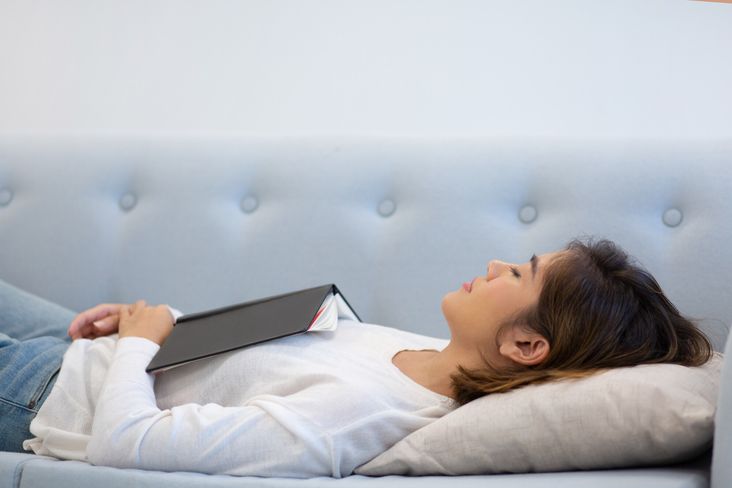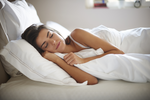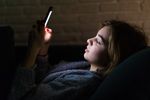Sleep Hygiene Tips: Best Practices for Focus & Productivity
Aug 5, 2025 by Vreny Blanco · 15 min read · Focus, Wellness

Quality sleep is the foundation for sharp thinking, creativity, and productivity. But many of our everyday habits—especially evening screen time—can sabotage our rest without us knowing it. As research shows, without deep, natural sleep, our minds simply can’t function at their best.
This post shares the best sleep hygiene tips and techniques—easy changes you can make tonight to improve your sleep and unlock greater focus, one night at a time.
📲 How Blue Light Affects Sleep and Productivity
Our bodies are wired to follow natural light. Before electricity, sunset signaled it was time to wind down for sleep. Now, our evenings are filled with the glow of phones, screens, and bright lights.
Even small amounts of artificial light—especially blue light from screens—can trick your brain into thinking it’s still daytime. This blocks melatonin, the sleep hormone, making it much harder to fall and stay asleep.
As Johann Hari explains in Stolen Focus, late-night screen time sends your body the wrong signal, telling it to stay alert when you really need to power down.
The bottom line? Scrolling through your phone or streaming shows at night makes deep, refreshing sleep harder to get.
Limiting blue light before bed is one of the simplest ways to improve your rest—and, with it, your focus the next day.
😴 Why Sleep Hygiene Matters
Sleep isn’t just downtime. Your brain relies on it to recharge, clear out toxins, and function at its best:
Brain Detox
During deep sleep, your brain is rinsed with cerebrospinal fluid that flushes out toxic proteins and other waste built up during the day. This cleansing process is key for staying mentally clear and protecting your long-term brain health.
Memory and Creativity
Quality sleep helps your brain transfer new things you’ve learned into long-term memory, and gives you the clarity and creative spark to solve problems and see patterns the next day.
REM Sleep Needs Time
The most restorative dream stage, REM, only happens during the last few hours of a full night’s sleep. If you regularly sleep just five or six hours, you’re missing out on this vital phase—and on the memory and creative benefits that come with it.
Sleep Loss Impairs Like Alcohol
Even mild sleep deprivation has a major impact on your mind and focus.
Just losing a couple hours of sleep each night quickly adds up. If you stay awake for nineteen hours straight, your ability to think clearly and focus drops to the level of someone who is legally drunk.
Over the course of a week or two of sleeping poorly, your mood, learning, memory, and reaction time can sink to the same level. Sleep isn’t just restorative; it’s essential for clear thinking and safe decisions—so losing it carries real risks.
Affects Kids Even More
Sleep loss is especially harmful for children. When deprived of sleep, kids often become manic, struggle to focus, and start having more behavioral and mood problems.
No wonder so many of us feel foggy, distracted, or moody after restless nights. When you’re well-rested, your attention, memory, and mood all improve—and everyday tasks become much easier.
☕️ Why Sleep Aids and Caffeine Can’t Replace True Sleep Quality
When we’re exhausted, many of us reach for coffee, sugary snacks, or sleep aids, hoping for a quick fix. However, these remedies don’t provide what we truly need.
Sleep Aids Disrupt Your Body’s Natural Rhythms
Over-the-counter sleep medications and melatonin supplements may seem like a shortcut to rest, but they can actually undermine your body’s ability to achieve truly restorative sleep.
Typical doses of melatonin—even those sold at most pharmacies—can “blow out” your natural melatonin receptors, making restful sleep increasingly elusive over time. Likewise, sedatives merely induce unconsciousness rather than genuine, restorative sleep, often leaving you groggy rather than refreshed.
Caffeine Simply Conceals Your Fatigue
Coffee and energy drinks block adenosine, a molecule that signals to your brain that it’s time to rest. While caffeine offers a fleeting sense of alertness, it only masks tiredness without replenishing your energy reserves. When the effect fades, the underlying exhaustion often returns—amplified.
Sustainable focus requires more than a patchwork of temporary stimulants or sleep aids. The real solution lies in cultivating habits that support your body’s natural sleep architecture, allowing you to experience the restorative power of deep rest.
🥱 Poor Sleep Hygiene: How Kids and Adults Lose Focus
One of the most surprising findings is that kids can be even more sensitive to sleep loss than adults. Studies show that when children miss out on enough rest, attention problems can surface almost immediately—sometimes even triggering manic or hyperactive behavior.
Adults aren’t spared either. A lack of real sleep chips away at self-control, making it harder to resist screens or sugary snacks late at night. As sleep deprivation sets in, it becomes more difficult to manage cravings, regulate mood, or even remember simple things.
Poor sleep can quickly turn into a vicious cycle. If you don’t rest well, it’s harder to focus and stay on task the next day. You get more easily distracted, which can make it even tougher to fall asleep or get quality rest later. Over time, this ongoing cycle makes it harder to learn, stay productive, and simply feel your best.
🍩 Sleep, Sugar, and the Glucose Crash
Lack of sleep doesn’t just drain your focus—it can also send your cravings and blood sugar on a rollercoaster.
As French biochemist Jessie Inchauspé (the Glucose Goddess) shares, even one rough night can leave you feeling grumpy, foggy, and desperately reaching for pastries or sugar just to get through the morning.
There’s real science behind this: when you’re sleep-deprived, your body struggles to regulate glucose. The same breakfast that was fine the day before can cause a higher blood sugar spike after a poor night’s sleep. And those bigger glucose spikes? They kick off a cascade: less energy, more hunger, and more cravings.
🛠️ How to Improve Your Sleep Hygiene for Better Focus and Glucose Levels
Good sleep helps balance mood, cravings, focus, and long-term health. Feeling “off” after a bad night has a biological explanation, but smart habits can help you break the cycle.
If you’re struggling to get a really good night’s sleep, start small and build new habits gradually. Every step counts.
How can you break the cycle? The solutions are simple and supported by science. Try these evidence-backed habits:
1. Turn Off Screens at Least Two Hours Before Bed
- Put away your phone and other screens at least two hours before going to sleep.
- Use this time for quiet activities like journaling, breathing exercises, stretching, meditation, yoga, or reading (from a book, not a screen).
- Giving your brain this break helps your natural sleep signals kick in, so you can fall asleep more easily.
2. Make Your Bedroom Cool and Dark
- For deeper, more effective rest, aim to keep your bedroom around 66°F (19°C).
- Block out all sources of light. Light-blocking or blackout curtains, or a sleep mask, can help you achieve this.
3. Reserve Your Bed for Rest
- Avoid bringing your phone, tablet, or laptop to bed. This helps your mind associate your bed with sleep—not work or entertainment.
4. Aim for 7–9 Hours of Sleep Each Night
- Getting regular, high-quality sleep is more important than you might think. Even mild sleep deficits can hurt your performance, focus, and mood.
- Most adults need at least 7–9 hours because your body cycles through different sleep stages—including deep and REM sleep—throughout the night. The most restorative dream sleep (REM) mostly happens in the later cycles, meaning if you cut your sleep short, you miss out on the full mental and emotional recovery your brain needs.
- Prioritizing a full night’s rest helps you wake up clear-headed, focused, and ready to tackle the day.
5. Let Your Body Follow the Natural Light Cycle When Possible
- Wake up with sunlight and limit artificial brightness at night. Over time, this can make falling asleep and waking up easier and more natural.
6. Get Natural Light First Thing in the Morning
- As soon as you wake up, open your curtains or step outside. For example, you might walk your dog before work, drink your coffee on the balcony, or simply stand by the window to soak up some daylight.
- Morning sunlight helps regulate your circadian rhythm—promoting steadier energy and more balanced glucose all day.
7. Start Your Day With a Savory, Balanced Breakfast
- Prioritize protein, healthy fat, and fiber. This supports stable energy and can dramatically cut down on mid-morning cravings.
- Options for a savory breakfast include eggs, fish, nuts, protein powder, or even leftovers from dinner.
8. Move for 10 Minutes After Breakfast
- A brisk walk or even a short dance gives your body a jump start handling glucose, smoothing out any post-breakfast spikes.
- Personally, I love a “chair workout” with the LazyFit App—no equipment needed, and you don’t even have to leave your chair. Each session is just 10–15 minutes, so it’s easy to fit in.
- Another favorite routine of mine: I work for at least 30 minutes on my treadmill desk after breakfast and after lunch. This has been one of the most important changes I’ve made to boost my health, concentration, and creativity.
When sleep is short, getting back on track with small daily habits can protect your body and mind. Rest is the foundation for stable energy, clearer thinking, regulated hunger, and stronger self-control.
🚫 Block Late-Night Distractions and Level Up Your Sleep Hygiene With 1Focus
Want to practice the best sleep hygiene tips and techniques? One of the most effective strategies is to use 1Focus to schedule an “offline” period each night.
Set 1Focus to block distracting apps and websites in the evening. Your Mac won’t tempt you, so you can protect your rest and build better sleep habits—without late-night interruptions.
Deep, undisturbed rest is non-negotiable for anyone who wants real focus, creativity, or productivity. Prioritize your sleep hygiene, block blue light, and don’t let “just one more video” or scrolling through social media steal your recharge.
The more you protect your sleep, the more you’ll accomplish.
💡 Tips From Personal Experience
How I Reduced My Screen Time
When I realized how much time I was spending on social media every day, I decided to delete all my accounts. This had an incredibly positive impact on my mental health, and the endless late-night scrolling in bed suddenly wasn’t an issue anymore.
I took it step by step: First, I used 1Focus to block social networks temporarily, then I deactivated some accounts for days or weeks at a time. In November 2024, I finally deleted everything. It’s hard to believe how much time I used to spend on there—even on LinkedIn!
To cut down on my screen time and evening binge-watching, I use 1Focus to block Netflix, Disney+, and YouTube on my Mac every day— access is limited to just one hour a day! The surprising thing: I got used to it and don’t even think about it anymore.
How I Improved My Sleep Quality
- I track my sleep with a smartwatch, which helps me better understand my sleep habits and maintain a regular sleep schedule.
- My phone always stays out of the bedroom.
- I block all apps and websites from 9:30 p.m. to 6:00 a.m. on my Mac with 1Focus.
Working Out While Working From Home
As I mentioned, I have a treadmill desk: I got myself a height-adjustable desk and a small treadmill. While working, I alternate between sitting, standing, and walking—so I easily hit 15,000 steps a day.
I really like the “LazyFit” app and the “Fitness Blender” website because they offer great at-home workout programs.
How I Handle Caffeine
When it comes to coffee, I now only have one cup with breakfast. If I feel like having a second, I go for decaf—I just love the taste and smell.
If I want another warm drink, I’ll have green tea or matcha, which gives me a gentle energy boost without keeping me up at night.
Everyday Glucose Hacks
From the Glucose Goddess tips, the main thing I’ve adopted is having a savory breakfast—one of the most important things I can recommend! It really helps me avoid cravings and “brain fog” after meals.
How I Practice Mindfulness Every Day
I regularly do breathing exercises and use the “Insight Timer” app for meditation or guided breathing sessions.
My Morning Routine
My trick is to always combine just one new habit with something I already do regularly.
For me, my morning routine actually starts the night before—because to wake up energized, I make sure to set myself up for a good night’s sleep. Here’s my routine:
- I have my last meal by 6 p.m. at the latest.
- Exercise: Strength training three times a week, and stretching every night before bed.
- Starting at 9 p.m., I prep breakfast for the next day and think about what I want to accomplish.
- I try to be in bed by 10 p.m. and usually fall asleep around 10:30.
- I usually wake up naturally around 6 a.m., or by 6:45 at the latest.
- Since my breakfast is prepped or at least planned (inspired by the Glucose Goddess tips), I don’t have to think much in the morning and can eat right away.
- While eating breakfast, I often call my parents and “have breakfast” with them.
- After breakfast, I do a chair workout with LazyFit and finish with a breathing exercise using Insight Timer.
- Then I start my day feeling fresh and focused!
It might sound like a lot, but if you add one thing at a time to your routine, it becomes a habit—and your mind will thank you for it!
📝 Most Important Sleep Hygiene Rules
Here’s a quick recap of the most important sleep hygiene rules to help you put these strategies into practice:
- Keep a consistent sleep schedule: Go to bed and wake up at the same time every day, even on weekends.
- Use your bed only for sleep and intimacy: Avoid reading, watching TV, or working in bed to strengthen the association between your bed and sleep.
- Go to bed only when sleepy: Don’t lie awake in bed; if you can’t fall asleep within 20–25 minutes, get up and do a relaxing activity until you feel tired.
- Keep naps short or avoid them: If you need to nap, keep it brief (under 20–60 minutes) and earlier in the day.
- Create a relaxing bedtime routine: Wind down at least an hour before bed with calming activities like reading, stretching, or meditation.
- Optimize your sleep environment: Keep your bedroom cool (about 60–67°F / 15.6–19.4°C), dark, quiet, and comfortable with good bedding.
- Limit caffeine, nicotine, alcohol, and heavy meals before bedtime: Avoid these substances, especially in the evening, as they can disrupt sleep.
- Get morning sunlight: Exposure to natural light early in the day helps regulate your sleep-wake cycle.
- Exercise regularly, but not too late: Morning or late afternoon exercise can improve sleep, but avoid vigorous workouts near bedtime.
- Manage stress: Relaxation techniques, journaling, or mindfulness meditation can help prevent sleep disruption caused by stress or anxiety.
These guidelines collectively help you fall asleep faster, stay asleep longer, and improve your overall sleep quality by supporting your body’s internal clock and minimizing disruptive habits or environmental factors.
Looking for more tips? Check out our blog post: Guide to Optimal Sleep Hygiene.
❓ FAQ: Sleep Hygiene, Blue Light, and 1Focus
What are the top sleep hygiene tips for better focus?
Go to bed and wake up at the same time every day, keep your bedroom dark and cool, avoid late-night screens, start your morning with natural light and movement, and use tools like 1Focus to block digital distractions from your nightly routine.
How does blue light affect sleep and melatonin?
Blue light (from phones, tablets, and computers) delays your brain’s release of melatonin, making it harder to fall asleep. Using 1Focus to block screen time in the evening helps you maintain a consistent sleep schedule and supports your body’s natural sleep cycle for better rest and focus.
Can melatonin supplements or sleeping pills improve my sleep hygiene?
Melatonin supplements and sleeping pills can disrupt your body’s natural rhythms if overused—they’re not a substitute for good sleep hygiene practices. Try improving your environment and bedtime routine first for long-term results.
How can I improve my sleep pattern if I have trouble falling asleep?
Start by following core sleep hygiene tips: dim the lights early, cut out screens (with 1Focus if needed), keep your space cool and quiet, get morning sunlight, have a savory breakfast, and stick to a consistent schedule—even on weekends.
Why should I block distractions at night?
Blocking digital noise with 1Focus helps you unwind, avoid blue light’s negative effects, and supports your brain’s natural sleep signals for deeper, more restorative rest.
📚 Want even more practical ways to sleep better?
- How to Use 1Focus for a Distraction-Free Sleep Environment: Tips for using 1Focus to block late-night distractions and create a restful evening.
- Sleep Hygiene Checklist: More tips on sleep hygiene—perfect for daily use or quick review.
Subscribe to the 1Focus Blog RSS feed and stay on top of the latest productivity strategies!
The recommendations in this article are based on Stolen Focus by Johann Hari and insights from Jessie Inchauspé (“The Glucose Goddess”), as well as the author’s personal experience and opinions. This article is not sponsored, and no compensation was received for its creation. It is intended for educational purposes only and is not a substitute for professional medical advice.



